Sideways (2004)
"No, if anyone orders Merlot, I'm leaving!"
Luke Honey’s WEEKEND FLICKS. Cinema for Grown Ups is a reader-supported publication. To receive new posts and support my work, please consider becoming a free or paid subscriber.
I like enthusiasts. YouTube is full of them, keen to initiate you in the mysteries of their various obsessions, although, my God, they like to talk. I’m currently following an actor broadcasting from his private garage in Cheshire, who’s restoring a 1970s Rolls-Royce Corniche in agonising, technical detail, down to every last nut and bolt. His rather well-made videos are set to soothing Erik Satie-ish music — and if you’re an insomniac, it’s actually rather therapeutic. ASMR (Autonomous Sensory Meridian Response), I think, is what they call it. I’ve also discovered the ancient Chinese art of Tai Chi, which may be of help to my broken right arm. Previously, I had dismissed it — foolishly — as something only wizened old people did in Victoria Park, Hong Kong, but now, courtesy of the algorithm, YouTube is bombarding me with slick videos of super-hot, slinky Chinese girls in Tangzhuang, practising their dangerous Kung Fu moves — like something from The Man with the Golden Gun (1975).
Which takes us to Sideways (2004). Its hero, forty-something Miles (Paul Giamatti), has a YouTube-like obsession with the Pinot Noir grape, i.e., the grape that produces Burgundy in France, and other notable wines across the globe, including, of course, those from the United States. Miles is a genuine and discriminating wine enthusiast in the sense that he knows what he’s talking about, and is prepared to ignore public opinion; to express the courage of his own convictions (the definition of a genuine connoisseur) — altho’ I have no idea if he would agree with Auberon Waugh’s marvellously unsnobbish observation (The Entertaining Book [1985]) that “there are some perfectly decent wines in the very cheapest price brackets, and (some) outstandingly good ones in the next two…”, and Miles’s idiosyncratic denial of the Merlot grape, apparently led to a 2% drop in Merlot sales in the United States.
So often, wine bores are successful middle-aged financiers: perhaps, the worst of all the bores. A massive generalisation, of course, and probably horribly unfair, but, alas, there’s some truth in it. You know, you’ve made your mint, which means you can now run with the Big Boys and afford the Petrus and the Romanée-Conti; you’ve learnt the difference between a Burgundy and a Claret, which turns to disdain for the little man, or woman, who’s happy to order a twenty-quid bottle of the house red. Roald Dahl satirised this brilliantly in his short story, The Butler (1974), first published in Travel & Leisure magazine, where a butler switches rare and expensive clarets for cheap Spanish red, keeping the prized stuff back for himself, and his swanky, nouveau-riche employer, who’s supposed to be a wine connoisseur, can’t tell the difference.
But aside from Miles’ genuine love of wine (the sincerity is attractive), the rest of his life is a near-disaster. He’s a depressive. His wife has left him for a Brooks Brothers success story. His aspiring career as a writer is met with failure and rejection (his agent dumps him). He has a dead-end job, somewhere, teaching English. Then he sets off on a road trip with old university friend, Jack (Thomas Haden Church): destination: the vineyards of Santa Barbara County, California. Jack’s about to get married to his Armenian girlfriend, so it’s a sort of boy’s own Stag week for the two of them. Male-bonding (a chew of the cud), a round or two of golf, decent food, and, of course, superb wine. That, at least, is Miles’s plan. But Jack’s idea of fun is entirely different. It’s more about a roll in the hay than a glass of Sea Smoke, 2001; a last snatch of illicit, pre-wedding nooky.
Honestly, they’re a pair of losers, those two. Miles nicks a stash of dollar bills from his elderly mother, kept in a tin in her bedroom drawer, and then we discover that the reason his wife left him was because he had had an affair with someone called Brenda. And Jack’s a washed-out actor: somebody who, back in their twenties, might have made it — with his clean-cut Californian surfer good-looks, I can see him on Baywatch — but now, in his forties, he’s doing voice-overs for insurance commercials. He’s a bit of a vegetable too, a likeable Neanderthal, controlled by his animalistic urge to sleep with anything in a skirt, a man who lives for the moment and seems incapable of assessing the consequences of his actions. Inevitably, the boys hook up with two attractive women, both of the oenophilic bent — Stephanie (Sandra Oh), who’s available, for Jack; and Maya (Virginia Madsen), who’s divorced, for Miles. Virginia Madsen’s especially sympathetic as Maya; readers may remember her as one of Frasier’s many girlfriends.
Sideways (2004) was a huge hit at the box office, meeting rave reviews from the critics, with Roger Ebert giving it four out of four stars, writing that ‘what happens during the seven days adds up to the best human comedy of the year — comedy, because it is funny, and human, because it is surprisingly moving’ and the Writers Guild of America, in 2013, went as far as describing it as, I quote, ‘the 90th greatest [movie] ever written…’ It also won two Golden Globes. Interestingly, Broken Flowers (2005), which we covered on Friday, and a film which I rate highly, and which, in some ways, covers similar territory to Sideways (2004), performed less well at the box office, despite the similar road movie genre of both films. But then Bob (in Broken Flowers) drives a hired Ford Taurus, while Miles (in Sideways) drives a stylishly beaten-up Saab Turbo convertible (the Swedish Panzarwagen) — the perfect car for a driving holiday. I know that, ‘cos I’ve done it myself. And, of course, the wine biz is big, big business in California. At Disneyland, in Orlando, there is — or was — an attraction (or with my mean hat on, an ersatz facsimile) going under the name of The Californian Wine Experience, and the queues outside (like cattle sprayed from water pipes, above) gave a new meaning to the philosophy of queuing — a concept usually (mistakenly) only applied to the British. Frankly, it would have been quicker to have driven to the actual, real-life vineyards themselves.
So there you go. Sideways (2004). It’s witty, dry (if not in the alcoholic sense), at times very, very funny (the sex scenes are to die for), and ultimately sad: even if the final moment gives us grounds for hope. The Americans gave us several independent celluloid crackers in the late 90s and the very early 2000s, for which I am grateful. I will see what else I can dig up for you.
I watched Sideways (2004) on DVD, and it is also available on Blu-ray and Amazon Prime Video for a very affordable £5.99 download for the complete film (i.e. for keeps).
Today’s post is Film No. 180. There are two options on Luke Honey’s WEEKEND FLICKS. Cinema for Grown Ups: ‘Paid-for’ subscribers get an extra exclusive film recommendation every Friday morning, plus full access to the complete archive.
It costs £5 a month (or £50 a year) — a bargain, frankly, when you compare it to a few cups of coffee, a packet of semi-legal gaspers, or a pint of beer in the pub. ‘Free’ subscribers get access to the Sunday newsletter, plus the ‘free subscriber’ films in the archive. Either option is a good bet. And when I get my act together, I’m planning to add a spoken voiceover (mine!) for paid subscribers. I will be back on Friday. Absolutely no idea what it’s going to be, but I’ll see what I can find. In the meantime, let’s raise more than a glass of Californian ‘Pinot Noir’ to Sideways (2004). Until then, Adios.
.


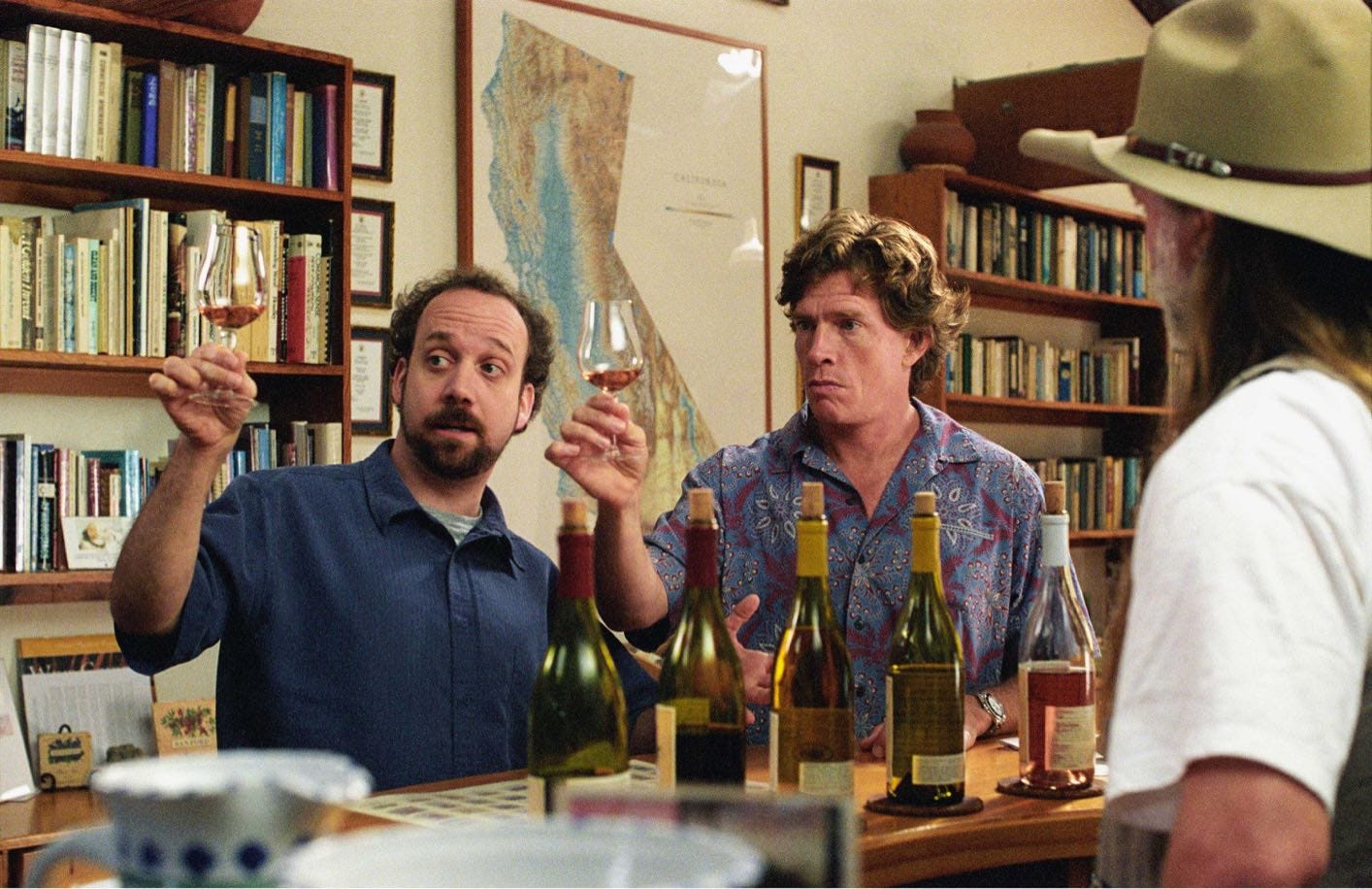
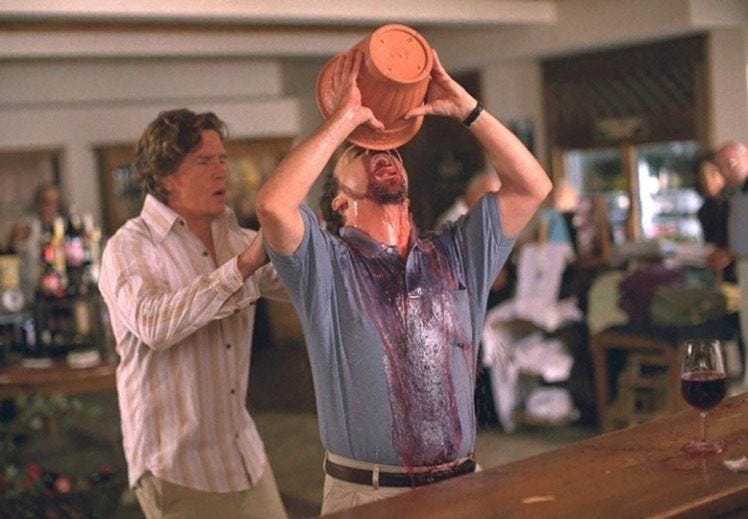
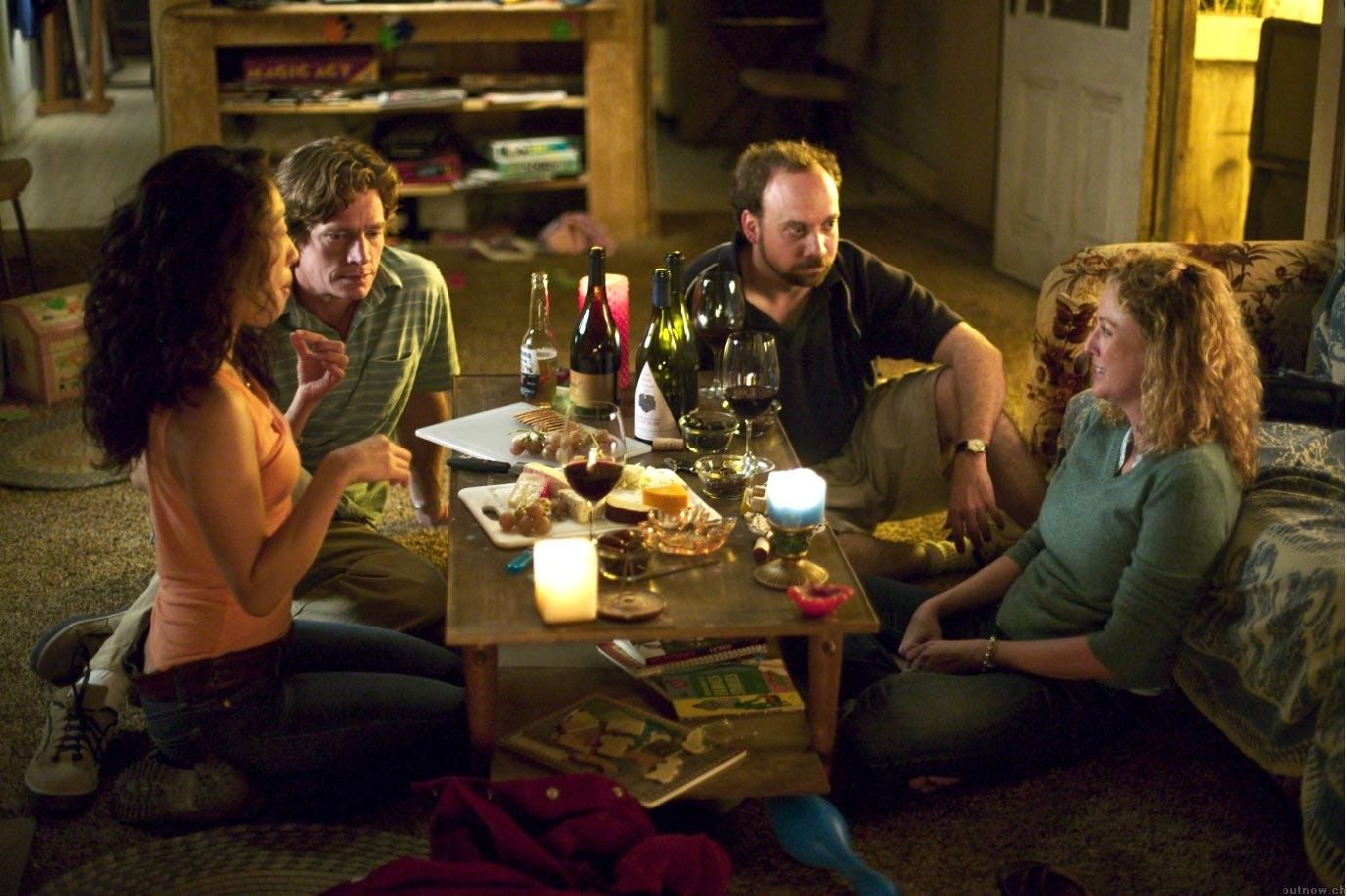
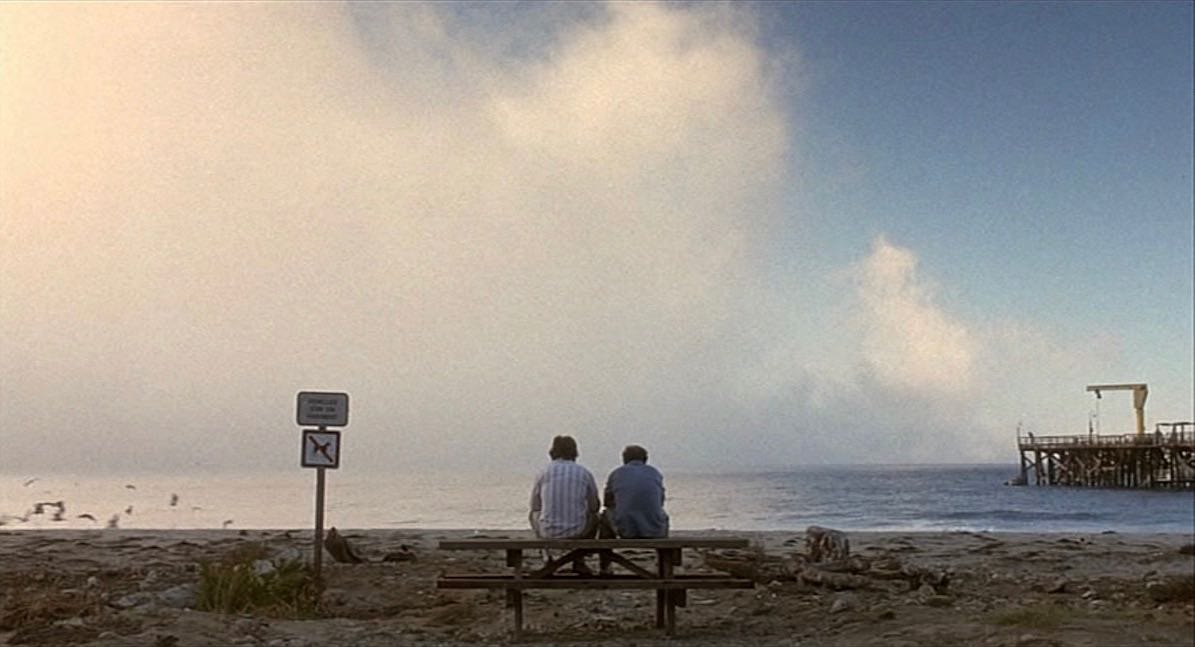
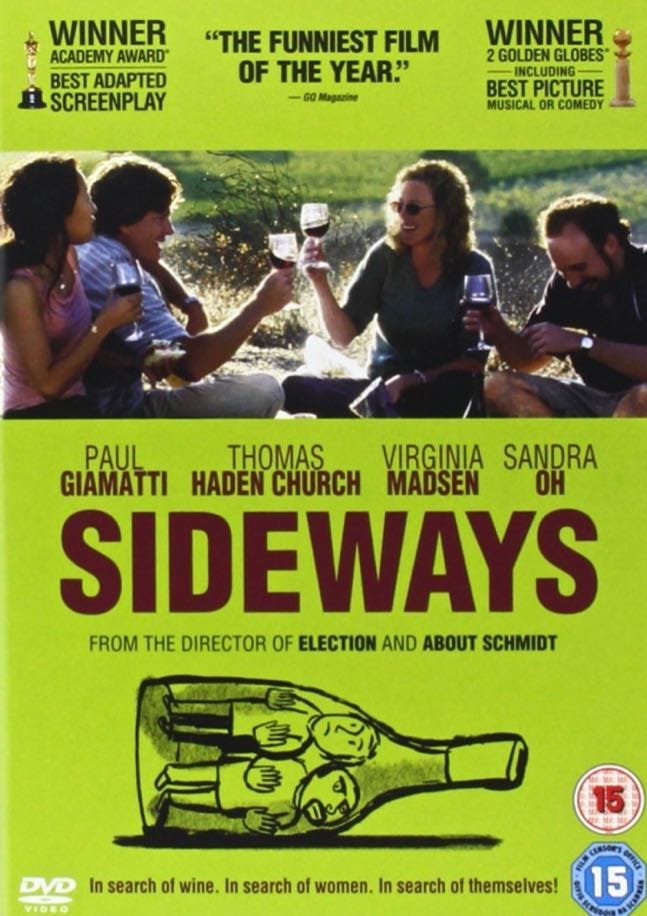
Are you chewing GUM?
I love this film.
And yes, Miles appears like a loser at first glance. But Sideways complicates that image. Miles is also deeply sensitive, intelligent, and passionate - especially about wine. His long monologue about pinot noir, fragile and demanding yet capable of incredible beauty, is one of the film’s turning points, and it’s hard not to read it as self-description. By the end, though his life is still messy.
So is he a loser? Superficially yes, but the film argues that he’s more of a flawed, wounded human who hasn’t given up completely. He may not be “winning” in conventional terms, but he isn’t finished either.